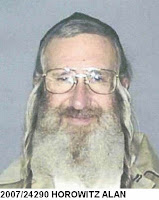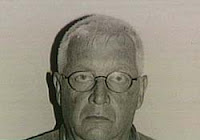He’s known as the NAMBLA Rabbi. NAMBLA, if you remember, is the North American Man/Boy Love Association, of which the defrocked priest Paul Shanley had “affiliations.” The man pictured is A.J. Horowitz, who according to The Awareness Center is a practicing rabbi and child psychiatrist in South East Asia—and a convicted sex offender.
It’s unclear when and where he was ordained after studying at Harvard, Duke and University of Iowa. Blogger Luke Ford posted a recent comment from The Awareness Center and an article Horowitz allegedly wrote for NAMBLA.
The Prison Experience: Some Psychosocial Comments
By A. Shneur Horowitz (AKA: Dr. Rabbi Alan Horowitz)
After graduating magna cum laude from Harvard College, A. Shneur Horowitz received the M.D. and Ph.D. degrees from Duke University, and is an orthodox rabbi. After twenty years of following these professional interests, Horowitz is now a political prisoner in the United States.
Did you ever have a dream where everything seemed quite logical, and yet even at the time a part of your mind knew that when you awoke, the sense would be completely lost? Not only would you be unable to make a reasonable recounting to anyone else, but even to yourself the dream-events would appear disconnected and the logic bizarre. Talking about prison to those who have not been there, and for whom incarceration is not part of their culture, is very much like that. Both dreaming and imprisonment are alternate realities in which the usual checks and controls have been removed and replaced with other rules for which our normal experiences have left us unprepared.
This severe culture shock applies to all prisoners who have lived their lives in the middle class or mainstream society. We child-lovers, however, suffer a more profound and pervasive psychosocial disintegration because of circumstances relatively specific to us. Personal accounts serve an important purpose, helping those who are not here to appreciate our experiences. However, I would like to use this space to comment on just what it is that makes incarceration different, and worse, for child-lovers than for virtually anyone else. The first section discusses the psychosocial impact of imprisonment with reference to child-lovers. The second deals with special factors which impede our adjustment to incarceration. The third section introduces ideas relating to the possibilities for growth and positive outcome.
It should be noted that much of the material in this article is not relevant to all persons jailed for participating in intergenerational sex.
Continue reading if you have an iron stomach and a numbness to nightmares.























 More news and opinions than at a Shabbat dinner, right in your inbox.
More news and opinions than at a Shabbat dinner, right in your inbox.